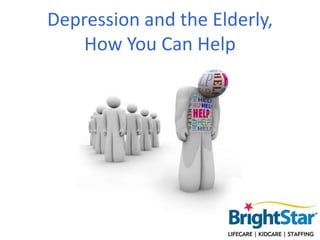
Depression and the Elderly, How You Can Help
- 1. Depression and the Elderly, How You Can Help
- 2. Depression is a disease that tends to be denied by the current generation of elderly people, many of whom were raised in an atmosphere where showing feelings was discouraged, and this adds to diagnostic difficulties. Social withdrawal is the most common telltale sign of depression.
- 3. Elderly patients may actively deny a depressed mood because of the perceived stigma of both depression and the need for help with psychiatric problems.
- 4. This issue has been recognized within the medical community. • A study with six rural family physicians in Nebraska showed that although the physicians felt they could usually recognize and treat depression adequately, they tended not to use the diagnosis of depression. • This was due to the fear that perceived stigma might threaten the doctor–patient relationship, and also compromise the future treatment of those patients who had depression recorded in their medical records. So, how can you help a loved one who you think is suffering from depression? Here are three tips
- 5. Don’t impose your terminology ‘No, I am not depressed’ may mean you need to listen carefully to discern what has changed in their life. For many elderly people, biological issues such as low appetite or poor sleep are more acceptable as reasons to request help. Try to use these issues as a hook to discuss ideas about how to sleep better or longer or improve appetite. Don’t say the words ‘depression,’ ‘drugs,’ or ‘therapy’ if an older adult doesn’t buy into the idea that they need help.
- 6. Don’t try to run that person’s life Caregivers should not to try to do things for older people that they can do for themselves. Doing things for a depressed person is often not helpful at all, because it reinforces their perception that they are worthless and incapable. Instead, help your elderly relative break tasks into steps and praise them for any efforts.
- 7. Try to participate in their medical care Because of confidentiality laws, doctors can’t disclose information to families without the patient’s permission. Many older people will give that permission but some won’t. Asking if you can accompany the family member to the doctor, just to be a second set of eyes and ears, is a good way to get access. Family members can also call the doctor me and let them know what they are seeing, and most doctors will think it helpful.
- 8. • Showing an interest in the life of an elderly person can be a great help in helping them work through depression. • The life experiences of the elderly can seem to revolve around loss, loss of friends as they move or pass away, loss of physical abilities, loss of health and loss of independence. • But there are still many joys that can be experienced and sometimes we need someone else to help us out of the darkness and back into the sun.
- 9. Help them get out of the house, get to social events or sit down for a meal with them. Eating can be a social event and having someone to talk to at meal time can be a great mood booster. It is important to try to maintain involvement Around mealtimes, shopping and food Preparation for as long as possible.
- 10. Remember, The happiest of people don’t necessarily have the best of everything; they just make the most of everything that comes along their way. This is true at any stage of life.
- 11. BrightStar knows the value and importance of compassion, dignity, and respect for all of our clients and their families across all stages of life. Whether you are in need of a little extra help around the house or concerned about a parent, grandparent, or loved one who is no longer able to properly care for themselves, BrightStar companion care services can provide the in-home care you’re looking for.
- 12. Find Quality Care Now Locate a BrightStar Near You! Find a location in the US Find a location in Canada
